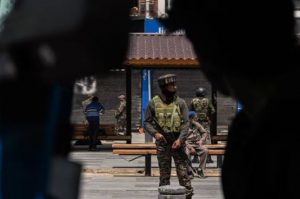Mock drills in nearly 300 districts with nuclear plants, refineries, other vital installations

New Delhi: Close to 300 ‘civil defence districts’ with sensitive installations like nuclear plants, military bases, refineries, and hydroelectric dams will be covered by mock drills on air-raid warning sirens, civilian training for a “hostile attack” and cleaning of bunkers and trenches.
How to conduct the mock exercise with active public participation of people was discussed threadbare at a high-level meeting chaired by Union Home Secretary Govind Mohan. Top civil and police officers of the country participated in the meeting, official sources said.
The Ministry of Home Affairs has asked all states to conduct the mock drills due to the “new and complex threats” that have emerged amid rising tensions with Pakistan following the Pahalgam terror attack.
The authorities in all states will involve students of educational institutions, employees of government and private organisations, hospital staff, railway and metro officials, besides uniformed personnel of the police, paramilitary and defence forces, while conducting the mock drills.
Sources said the ‘civil defence districts’ are different from the normal administrative district, as a geographical area having a cantonment or a refinery or a nuclear plant may be designated as a ‘civil defence district’ depending on the requirement and exigency.
“Such districts are designated by the respective state authorities, and we believe, the mock drills will be carried out in nearly 300 such civil defence districts across the country,” they said.
Uttar Pradesh Director General of Police Prashant Kumar said even though 19 districts have been identified by the central government for the mock drills, the state government has decided to carry out it in all districts of the state.
“We have received directions from the government of India for civil defence mock drills scheduled to be held on May 7. As many as 19 districts have been identified, out of which one district is in the A category, two are in the C category, and the rest of the districts are in the D category.
“However, considering the sensitivity, the state government has directed that the mock drills be conducted in all districts with all the verticals – civil, police administrations, fire services, disaster response force participating in it,” he told reporters in Lucknow.
According to a home ministry communication, the measures to be taken during the mock drills include the operationalisation of air-raid warning sirens, training civilians on civil-defence aspects to protect themselves in the event of a “hostile attack” and cleaning of bunkers and trenches.
The other measures are provisions for crash-blackout measures, early camouflaging of vital plants and installations and updating and rehearsing evacuation plans.
The mock drills also include the operationalisation of hotline and radio-communication links with the Indian Air Force (IAF), testing the functionality of control rooms and shadow control rooms.
“In the current geo-political scenario, new and complex threats/challenges have emerged, hence, it would be prudent that optimum civil defence preparedness in the states/UTs is maintained at all times,” the letter from the Directorate General Fire Service, Civil Defence and Home Guards to the states and Union Territories said.
The conduct of the exercise is planned up to the village level, and this exercise aims to assess and enhance the readiness of civil defence mechanisms across all states and Union territories.
The communication said the active participation of the district controllers, various district authorities, civil-defence wardens, volunteers, home guards (active and reservists volunteers), National Cadet Corps (NCC), National Service Scheme (NSS), Nehru Yuva Kendra Sangathan (NYKS), college and school students is envisaged in the exercise.
“The said civil defence exercise is aimed to assess the operational efficacy and operational coordination of various civil defence measures,” it said.
There have been rising tensions in relations between India and Pakistan after the April 22 terror attack in south Kashmir’s Pahalgam, in which 26 people, mostly tourists, were killed.
Prime Minister Narendra Modi has vowed to pursue the perpetrators of the attack and those who took part in its conspiracy to the “ends of the earth” to inflict punishment on them “beyond their imagination”.
PTI
News